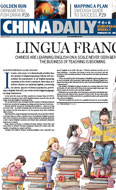Economy
Emerging markets to curb inflation, result uncertain
Updated: 2011-02-09 10:15
(Xinhua)
LONDON - The emerging markets have started taking measures to combat inflation which has become a serious problem for them so far, but uncertainties still exist on whether these policies will be successful, said Stephen King, chief economist of HSBC.
| ||||
King named the measures taken by most emerging nations, including raising reserve requirements for banks, lifting interest rates, controlling capital and preventing hot money from flowing in, as a set of "quantitative tightening" measures, the opposite of "quantitative easing" in the developed countries.
"These are 'experimental policies' because we have never seen a world economy going through this process of quantitative easing and quantitative tightening," King said.
King underlined policy takes quite a long time to feed through. "You can't bring inflation down immediately. But you can do something that will perhaps alter the longer term course of inflation," King added.
He also added part of the reason for changing policy is to signal investors that the central bank policymakers mean business, which is hopefully to control people's expectations about where inflation is heading, "because one of the biggest problems with inflation is if people expect more and more of it, the danger of real inflation will grow."
As for the main causes of this round of rising momentum of inflation in the emerging economies, King attributed it mainly to the strong growth in the emerging world and low interest rates in the developed world, as well as the unintended consequences of the latter's "quantitative easing" measures.
"People today can borrow very cheaply in dollars, euros or Stirling and then reinvest the money in other parts of the world that are growing very quickly and appear to have much better long-term growth prospects. The emerging world is the biggest recipient of this," King explained.
As for China, who is trying to curb the inflation through a mixture of reserve ratio changes and increased interest rates, King said the critical thing to watch in the country is the growth of "money supply."
"If money supply remains quite strong, then that will be a worry. If it starts to slow down, it would be the first indication that perhaps the changes in policy are going to reduce domestic liquidity which in turn will lead to lower inflation," King said.
King also pointed out that the importance of policy changes for China cannot be over emphasized, as China should balance well between two issues in terms of big-picture economics - improving people's living standard on average and controlling the rise in income inequality, which, if not handled well, can cause "political and social instability."
"For 2011 we are reasonably optimistic of the slowdown being not too much. The forecast we have of China's growth this year is a little less than 9 percent, which is actually a pretty low growth rate by Chinese standards," King said.
E-paper

Chinese tourists as top shoppers
Since last summer, Chinese tourists emerged as the top tax-free shoppers in Europe.
Golden run ahead
Looking abroad
Mapping out a plan
Specials

The green lantern
Environmental concerns are shedding new light on a colorful tradition

Inland interchange
Chongqing bets on its position as a hub for China's west.

Zooming in on Chinese skies
Helicopter companies ride on country's growing interest in luxury aviation.




